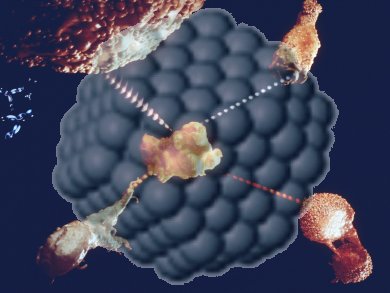Dayang Wang and co-workers, University of South Australia, have used living human cells to encapsulate medicine so that it can better reach diseased parts of the body. Until now, biocompatible surface processing has typically relied on polyethylene glycol or other surface coatings, which are quickly recognized by the body as a foreign substance.
The team created cell membrane capsules by using living cells as factories to encapsulate the drugs or nanoparticles in natural vesicles. The vesicles were composed of cell membrane lipids and proteins and incorporated protein channels for the controlled loading and release of active substances. The capsules were almost identical to cells without nuclei which minimized recognition and allowed them to evade immune attack for longer than artificial carriers.
- Cells as Factories for Humanized Encapsulation
Z. Mao, R. Cartier, A. Hohl, M. Farinacci, A. Dorhoi et al.,
Nano Lett. 2011, 11(5), 2152–2156.
DOI: 10.1021/nl200801n



